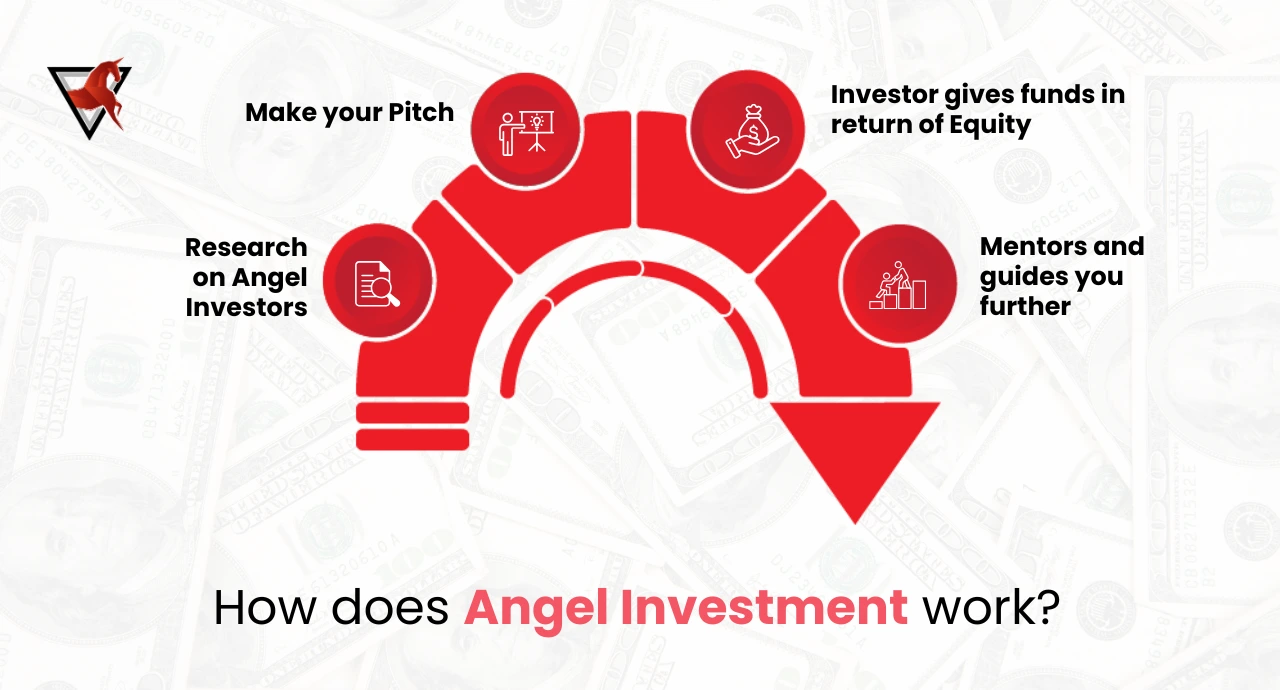
Angel Investing: An Introduction
The startup world is a place where ambition meets innovation, and neither can survive without the other—or funding, for that matter. Though many new businesses seek capital from the more traditional investment funds, early creation can definitely depend on the availability of angel funding through an angel investor.
Angel investors are usually rich individuals who invest in a company and, above all, in the vision of the founder, acting almost as a driving force for many successful startups. In return, they get an equity stake in the startup and the opportunity to participate in the shaping direction of it. Early-stage funding through an angel investor acts like the first boost that most startups need.
What is an Angel Investor ?
An angel investor refers to a private individual who invests her own money in the early stage of any startup. Unlike other traditional investors, most angel investors get drawn to high-risk initiatives with the potential to yield great future rewards and satisfaction in mentoring innovation. It is common to be familiar with angel investors who either have professional experience or are entrepreneurs themselves and thus are positioned to mentor new startups with knowledge and resources.
They also provide investment in startups at a time when few traditional sources are available, making them vital contributors to the start-up ecosystem.
Angel investors come in handy for both early-stage financing, especially for equity. To the growth startups, this might just mean an angel investor is all they require to give them the access to capital and confidence for further movement. This may be accompanied by mentorship deals since most of the angel investors have several years of experience and strategic ideas to bring to the table. With a persuasive pitch, the entrepreneurs attract not only funds but also guidance that will help them overcome obstacles and scale up. This in itself turns an angel investment into a business growth catalyst.
How Angel Investing Works ?
It is a very unique process, and many times very personal to the investor, whereby the investor is searching for high-growth potential startups, assessing risks, and then negotiating terms. For the angel investor, this generally includes a few key steps:
- The identification of opportunity: Most investors come across a startup through an angel investor network, introductions, or organizations like Marwari Catalysts, who present them with filtered companies.
- Due Diligence: Once an investor has chosen a startup, the financial details of the company and market opportunity regarding scalability are explained in detail.
Some possible ways in which angel investors structure investments are in the form of equity investment, convertible notes, or via a SAFE agreement.
High-Risk, High-Reward: Risk in early stage funding is offset against the high reward possible if it pays off in case the company succeeds.

Angel investors come in handy for both early-stage financing, especially for equity. To the growth startups, this might just mean an angel investor is all they require to give them the access to capital and confidence for further movement. This may be accompanied by mentorship deals since most of the angel investors have several years of experience and strategic ideas to bring to the table. With a persuasive pitch, the entrepreneurs attract not only funds but also guidance that will help them overcome obstacles and scale up. This in itself turns an angel investment into a business growth catalyst.
How Marwari Catalysts Stands Behind Angel Investors and Start-ups ?
The process of angel investing is exciting, yet filled with uncertainties. Here begins the role of Marwari Catalysts for support in both directions as a major player.
Marwari Catalysts acts like an accelerator in matching investors with entrepreneurs within a well-framed ecosystem, thereby benefiting both parties. In this regard, the early investment risks are cushioned for the investor, as Marwari Catalysts ensures that the selected startups are adequately prepared and connected with promising companies.
Curated Investment Opportunities
One of the major services provided by Marwari Catalysts is matching screened startups with investors. Finding the right startup often involves a great deal of challenge for investors themselves. Marwari Catalysts simplifies this task for investors by offering them an exclusive list of the best startups that contain immense characteristics for growth, novelty in ideas, and scalability. This will ensure that investors make informed decisions while knowing that such startups have undergone a strenuous filtering process.
Mentoring and Consultancy Services
Beyond financing, startups need strategic guidance in treading the labyrinth of growth. Thus, Marwari Catalysts also extends strategic advisory services to the startups on business planning, refining market strategy, and building sustainable operations. This mentorship provides comfort to the investors that their investment is not just money down but an investment in knowledge and experience by the cream of the industry.
Building an Ecosystem that Flourishes
A successful investment needs an enabling ecosystem, which is what Marwari Catalysts actively builds. Connections with startups translate into networks between entrepreneurs and investors concerning Marwari Catalysts, which ultimately benefit both parties. More importantly, this community-oriented approach ensures that there will be an enabling environment wherein startups get knowledge of others' successes, implement best practices, and access newer market opportunities.
Focus on Angel Investing in India.
With the impending growth of angel investors in India, the demand for angel funding has increased even more among the startups of India. Marwari Catalysts is a part of that movement that bridges private investors and startups, especially for those industries that have wholesome growth potential. The focus on fostering relationships and opportunities within India helped Marwari Catalysts build a reputation as an investor partner for those willing to make a big difference in nook and corner startup worlds.
The Marwari Catalysts thus foster not only mitigation of risk for the investors but also empower the entrepreneurs to make the right business decisions, leading to mutual benefit.
The Role and Benefits of Angel Investors in a Startup
Angel investors play an important role in the growth of all kinds of startups. For many, early-stage funding rounds can sometimes make all the difference between success and folding as a company.
The startups, through angel funding, reach a level where they can access finances to work towards product development, expansion of teams, and marketing of their solutions. Besides providing much-required growth capital, investors also bring mentorship and strategic insights instrumental in helping founders navigate various business issues. This is also a way for the angel investors to help validate the business model of the startup by building credibility that may attract more investors.

Angel investing has many attractive benefits, especially for those who want some diversification in their investment portfolio. Besides high returns on investments, an angel investor taps into an inner circle network of entrepreneurs and innovators with similar investors like themselves. This kind of community offers unparalleled access to learning, collaboration, and professional growth. Additionally, an angel investor invests in and benefits from the entrepreneurial journey, which may even bring personal satisfaction by seeing young businesses thrive. The opportunity to join high-growth startups and participate in their potential success makes the overall experience of being an angel investor both financially and personally rewarding.
Angel Investing vs. Venture Capital
Although they both invest money in the beginning, the two vary in size and time, with angel investors investing less money much earlier in the lifetime of a startup, while venture capitalists invest later into a company. Moreover, they are often more personally involved with startups, offering mentorship and various insights about the industry. On the other hand, a rule is that venture capital firms manage larger investment funds than those of angel investors and generally target fast growth and high profits.
Understanding these differences could further help founders make a decision on choosing the right investment type for their goals and timeline.
Conclusion
Angel funding has become 'in' in the world of startups for bringing ambitious ideas alive. The early-stage investment in the form of money contributed by angel investors brings in a lot of valuable support involving mentorship, connection, and industry expertise. Thus, interest investment in startups has been ignited, and many more entrepreneurs are eager to seek backing for their ventures. For investors looking to explore the opportunities in angel investing, Marwari Catalysts provides an essential bridge: curated investment opportunities and a thriving ecosystem that supports investors and entrepreneurs alike. This consultative approach ensures that investments are not only profitable but conducive to a dynamic and innovative business environment where new ideas are encouraged to flourish.
Also Read : The Journey of Deepesh Rajpal and ONEDOSE
FAQS
Who is an angel investor and how is she different from other investors?
Traditionally, an angel investor is considered a private investor, who invests personal money into early-stage startups. Angel investors tend to take higher risks in ventures unlike traditional investors as this is often accompanied by returns, and also the satisfaction of supporting innovation.
What do angel investors consider when they invest money in some startups?
Angel investors assess opportunities for high-growth businesses with a compelling vision. A good plan needs promising management to lead the opportunity. They assess the scalability and feasibility of the market and the potential to risk, where there could be a chance for the angels to use themselves.
What does angel finance play out in the real world?
Angel investors generally receive an equity stake, or a portion of ownership in the startup, in exchange for their investment. They can also make use of instruments such as convertible notes or a SAFE agreement to structure their investments.
What stage and why do startups need angel funding?
The provision of crucial capital at the earliest stage is key support from Angel funding towards startups in building their products, and their team, and making an early market appearance. This very initial investment can create a big difference in success in the world of startup success.
What are some of the roles Marwari Catalysts fulfills towards angel investors and startups?
Marwari Catalysts does what others do not-do : connecting suitable investors to quality startups. They curate some wonderful investment opportunities, have properly prepared the startup ventures through mentoring and strategic engagements designed to maximize success potential from every investor and entrepreneur association.
What are the prime risks and returns can one expect with angel investments?
Angel investing is a very high-risk affair, because many early-stage startups will fail. On the other hand, if some investments are successful, they can bring in great returns. Angel investors also feel a personal satisfaction in mentoring and nurturing innovative ideas.
How is angel investing in India different from the rest of the world?
Angel investment in India is spreading rapidly with the emergence of technology and innovation startups. Organizations such as Marwari Catalysts are boosting the local ecosystems to support growth, making it easy for investors to source promising startups across different sectors.
In what ways do mentorship and industry networks play into angel investing?
Other than capital, angel investors provide mentoring and networks that facilitate the startups in perfecting their business models, efficiency in operation, and brand recognition in the market.
What are the differences between angel funding and venture capital funding?
In other words, angel investors invest in a startup at an early stage when investments are relatively smaller and very personal. Venture capitalists invest larger sums a bit later and place much greater emphasis on accelerating growth and earning a better profit.
How does Marwari Catalysts ensure quality startups for recommendation to its investors?
Marwari Catalysts undertake extensive filtration to shortlist extremely high potential early-stage startups and afford them strategic support to set them in an optimal readied position for the investor to make well-informed investment decisions and minimize the risks of investment.
